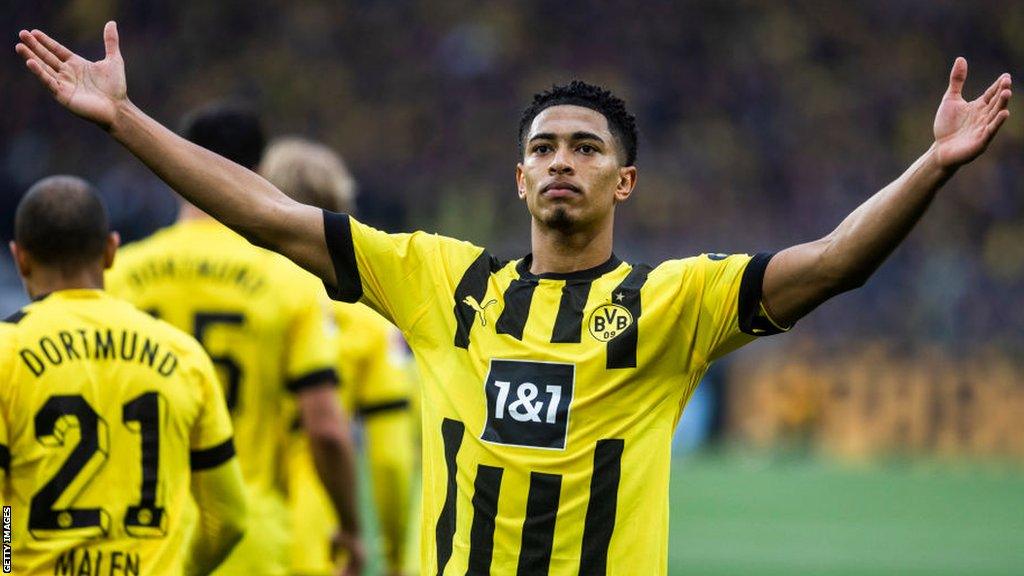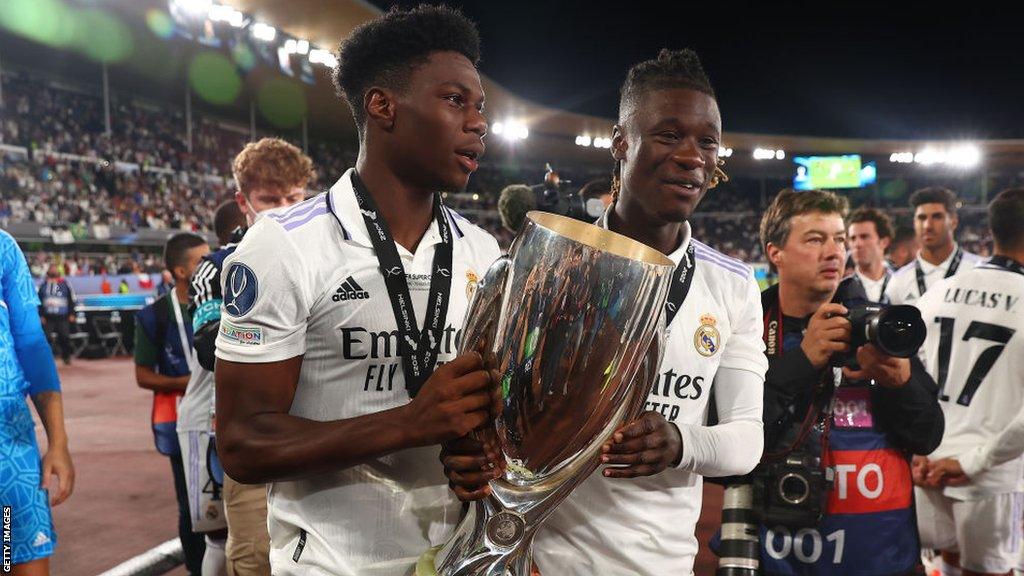Jude Bellingham: Why Real Madrid move makes 'perfect sense'
- Published

Jude Bellingham signed for Borussia Dortmund from Birmingham City in July 2020
Jude Bellingham's move to Real Madrid fits in very neatly with the club's transfer strategy - buy the stars of the future, rather than the biggest names of today.
The best way to understand how that approach has evolved is to look at the club's recent history in the market.
For many years, Real Madrid were renowned for being 'Los Galacticos' - a squad packed full of expensively assembled superstars, bringing unmatched glitz and glamour to their trophy-hungry fans.
The policy was instigated in 2000 by newly appointed president Florentino Perez, who started his spree by launching an audacious move to sign Luis Figo, the best player at eternal rivals Barcelona. He was quickly followed by Zinedine Zidane, Ronaldo, David Beckham and Robinho as Perez continued to spend.
Another wave of high-end purchases followed after Perez returned to the presidency in 2009: Cristiano Ronaldo, Kaka, Gareth Bale and James Rodriguez were among those recruited for massive fees, with Real determined to position themselves as the ultimate dream destination for any superstar with serious ambitions.
But then something changed. After years of spending every summer chasing the biggest names, Real halted the Galacticos policy and started to focus their recruitment strategy on the world's most promising youngsters.
Why Bellingham is 'worth £130m' - The view from Dortmund
This shift in strategy - envisioned by Perez and long-serving right-hand man Jose Angel Sanchez, and executed by chief scout Juni Calafat - was necessitated by a recognition of new economic realities.
After so many years of being untouchable in the transfer market, Real could no longer routinely compete with the vast wealth of the 'petrodollar' clubs. So they looked for an alternative route to success.
There would be the occasional exception - such as the ill-fated £100m move for Eden Hazard in 2019 and the ongoing pursuit of Kylian Mbappe - but Real largely stayed away from those major deals, instead scouring South America for teenagers who had the potential to make it big.
The first significant signing under this new policy came in 2017 when Real club spent 46m euros (£39m) on a 16-year-old Brazilian winger who would formally join when allowed to do so on his 18th birthday. His name was Vinicius Jr, now one of the most devastating attackers in the world.
Vinicius scored the winning goal in last year's Champions League final, with the assist coming from another player who had been scouted in South America as a teenager: Uruguayan midfielder Fede Valverde. Yet another hero of the 2021-22 knockout stages, whose feats included a dramatic late double against Manchester City, also travelled the same route: Brazilian winger Rodrygo, who joined Real from Santos at the age of 18.
Real also carry out the same strategy closer to home, reinforcing their ageing midfield in the past couple of seasons with France's brightest prospects: the then 18-year-old Eduardo Camavinga was signed for a reported 40m euros from Rennes in 2021, with Aurelien Tchouameni, a comparative veteran at 22, following a year later from Monaco for 80m euros.

Real Madrid have spent big on young midfielders Aurelien Tchouameni and Eduardo Camavinga in recent seasons
In this context, it's easy to understand why Real have secured the signature of England midfielder Bellingham, who will arrive in the Spanish capital from Borussia Dortmund for an initial 103 million euros (£88.5m). The deal, agreed in May, has now been completed, with Bellingham signing a six-year contract.
Real's long-standing policy of recruiting the world's best young players makes it only natural that they would want a 19-year-old who has already made almost 200 senior appearances and won 24 international caps.
Likewise, the club's proven willingness to give young players a chance to succeed at the highest level makes the Bernabeu an enticing destination for hot prospects who, like Bellingham, want to take their careers as far as possible.
And Bellingham will get plenty of chances to prove his worth with Real. Luka Modric, who will turn 38 early next season, and 33-year-old Toni Kroos are gradually becoming less significant for Los Blancos, whose classic trio was broken up last August with Casemiro's departure for Manchester United.
Bellingham would fit Real Madrid project - Balague
A midfield plucked from Bellingham, Camavinga, Tchouameni, Valverde and Dani Ceballos - signed from Real Betis aged 20 in 2017 and finally now becoming a regular - providing the ammunition for Vinicius, Rodrygo (and, who knows, Mbappe?) would be a remarkable vindication of Real's 'sign them young' policy.
And it is not stopping there - Brazilian Endrick has also agreed to join when he turns 18 in 2024.
Success is not guaranteed. For every Vinicius there is a Luka Jovic, who was bought from Eintracht Frankfurt for 60m euros in 2019 but flopped badly with only three goals in 51 appearances. For every Valverde there is a Martin Odegaard or Take Kubo, who were given limited (or, in the case of Kubo, no) first-team appearances before going on to flourish elsewhere.
But considering the transfer strategy followed by Real in the past few years, Bellingham to the Bernabeu makes perfect sense - and he may never have a better chance of becoming one of the best players in the world.
A version of this story was published on 12 May